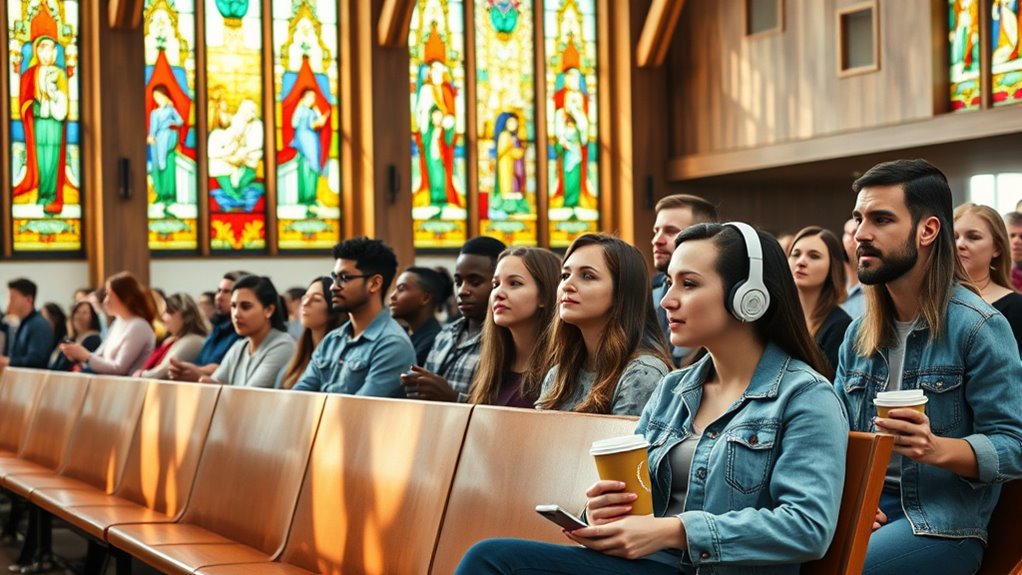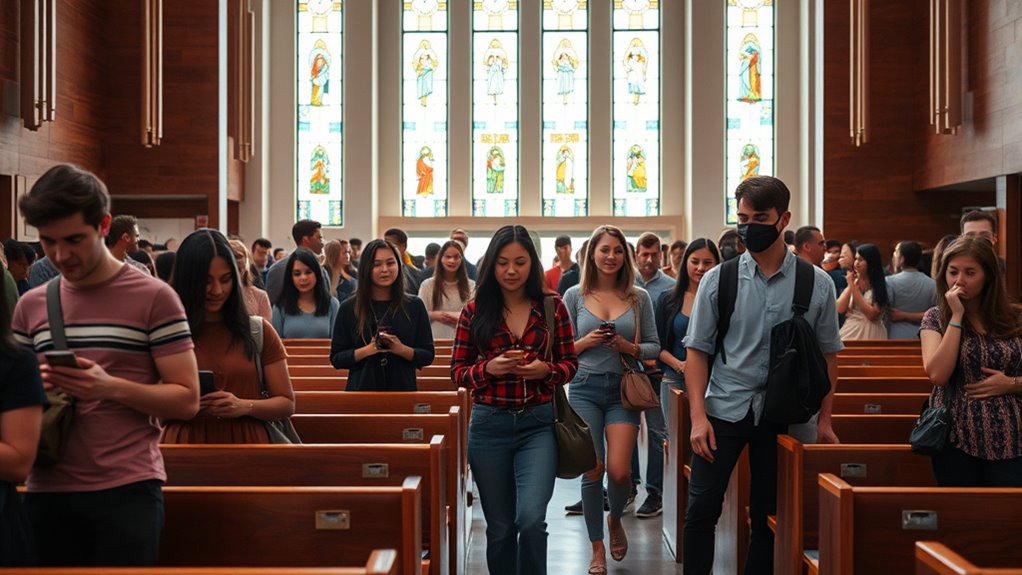You’ll find that Millennials attend church less frequently than previous generations, showing a clear decline in traditional engagement. They seek authentic experiences and meaningful relationships, often preferring personal spirituality over routine rituals. Many explore faith outside conventional settings, blending beliefs with personal values. Building genuine intergenerational connections and fostering inclusive environments help attract and retain younger members. To understand how these shifts are shaping faith communities, explore more insights below.
Key Takeaways
- Millennials’ church attendance has declined significantly compared to previous generations.
- They prefer authentic, meaningful faith experiences over traditional rituals and routines.
- Many Millennials are redefining spirituality, blending personal values with religious beliefs or exploring alternative practices.
- Intergenerational engagement and community involvement are crucial for attracting and retaining Millennials.
- Churches that adapt to evolving spiritual needs and foster inclusivity see higher engagement from Millennials.

Have you ever wondered why fewer Millennials are attending church today? It’s a question that many religious leaders and communities are grappling with as they notice declining numbers. One significant factor is the shift in how Millennials engage with faith and spirituality, which often involves a different approach to intergenerational engagement. Unlike previous generations that might have viewed church as a routine or obligation, Millennials tend to seek meaningful connections and authentic experiences. They want to see their faith reflected in real-life actions and community involvement rather than just traditional rituals. This desire influences their participation, making them more selective about where and how they engage with religious institutions.
This shift is part of what some describe as a broader faith evolution. Millennials are redefining what spirituality means to them, often blending religious beliefs with personal values or exploring alternative spiritual practices. They’re not necessarily abandoning faith but transforming it to fit their unique worldview. As a result, traditional church settings sometimes struggle to resonate with their evolving perspectives, leading to decreased attendance. They may feel that the church environment doesn’t adequately address the questions they have or reflect the diversity of their experiences. Instead, they seek spaces that foster genuine intergenerational engagement, where different age groups can learn from each other and share their perspectives openly. When churches create opportunities for multiple generations to connect—through service projects, discussion groups, or community outreach—they often find Millennials more willing to participate. This kind of engagement helps bridge the gap between different age groups and promotes a sense of belonging that Millennials crave.
Furthermore, the faith evolution among Millennials isn’t just about rejecting tradition; it’s about redefining what faith community means. They value authenticity over formality and are more open to exploring spirituality outside conventional church settings. Many are turning to online communities, podcasts, or informal gatherings that allow for more personalized spiritual growth. Additionally, fostering a sense of intergenerational connection within church communities can significantly impact their willingness to engage and stay connected. This trend indicates that traditional church attendance is dropping not necessarily because Millennials are losing faith but because they’re seeking different ways to express and nurture it. For churches aiming to attract this generation, embracing their faith evolution and fostering intergenerational engagement becomes vital. It’s about creating inclusive environments where all ages can learn from one another, share their journeys, and grow together. When churches adapt to these changing needs, they stand a better chance of reconnecting with Millennials and encouraging their active participation in faith communities.
Frequently Asked Questions
How Do Millennials’ Spiritual Beliefs Differ From Older Generations?
You’ll find that Millennials’ spiritual beliefs differ from older generations because they embrace more spiritual diversity and are often less tied to traditional organized religion. They tend to explore personal spirituality, value individual experiences, and are open to non-traditional beliefs. Unlike previous generations, Millennials prioritize authenticity and inclusivity, shaping their unique approach to faith. This shift reflects broader changes in generational beliefs, emphasizing openness and personal connection over institutional doctrines.
What Role Does Social Media Play in Millennials’ Faith Practices?
Social media plays a significant role in your faith practices by enabling digital outreach and fostering online faith communities. You actively seek inspiration and connect with others through platforms, making spirituality more accessible and interactive. This online engagement helps you explore beliefs, share experiences, and stay connected to your faith journey, often supplementing or replacing traditional church attendance. Social media therefore becomes a essential tool for nurturing your spirituality in the digital age.
Are There Regional Differences in Millennials’ Church Attendance?
Yes, regional engagement critically influences millennials’ church attendance. You’ll notice that cultural influences shape how often they attend services; in some areas, church is central to community life, boosting participation. In contrast, regions with diverse beliefs or secular trends see lower attendance. So, your local culture and community norms play an essential role in shaping millennials’ faith practices and their engagement with church activities.
How Have Recent Societal Changes Impacted Millennials’ Religious Engagement?
Recent societal changes, like cultural shifts and technological influence, have greatly impacted your religious engagement. You’re more likely to explore spirituality online, participate in virtual communities, or prioritize personal beliefs over traditional church attendance. These changes make it easier to connect with faith on your terms, but they also mean you might attend church less regularly. Technology’s role encourages individual exploration, leading to a more personalized and flexible approach to spirituality.
What Initiatives Successfully Attract Millennials to Church Communities?
You can attract millennials to church communities through innovative outreach and active community involvement. Use social media to share relatable stories and create engaging events that resonate with their interests. Encourage participation in service projects and community initiatives, showing how faith translates into real-world impact. By fostering authentic connections and offering relevant, welcoming environments, you make your church appealing and accessible, helping millennials feel motivated to join and stay engaged.
Conclusion
You might be surprised to learn that only about 35% of Millennials attend church regularly, highlighting a significant shift in religious engagement. This data suggests that many Millennials are seeking spirituality outside traditional settings or prioritizing different values. Understanding this trend can help you find new ways to connect and engage with this generation. Recognizing these changes allows you to adapt and foster meaningful spiritual communities that resonate with Millennials today.










